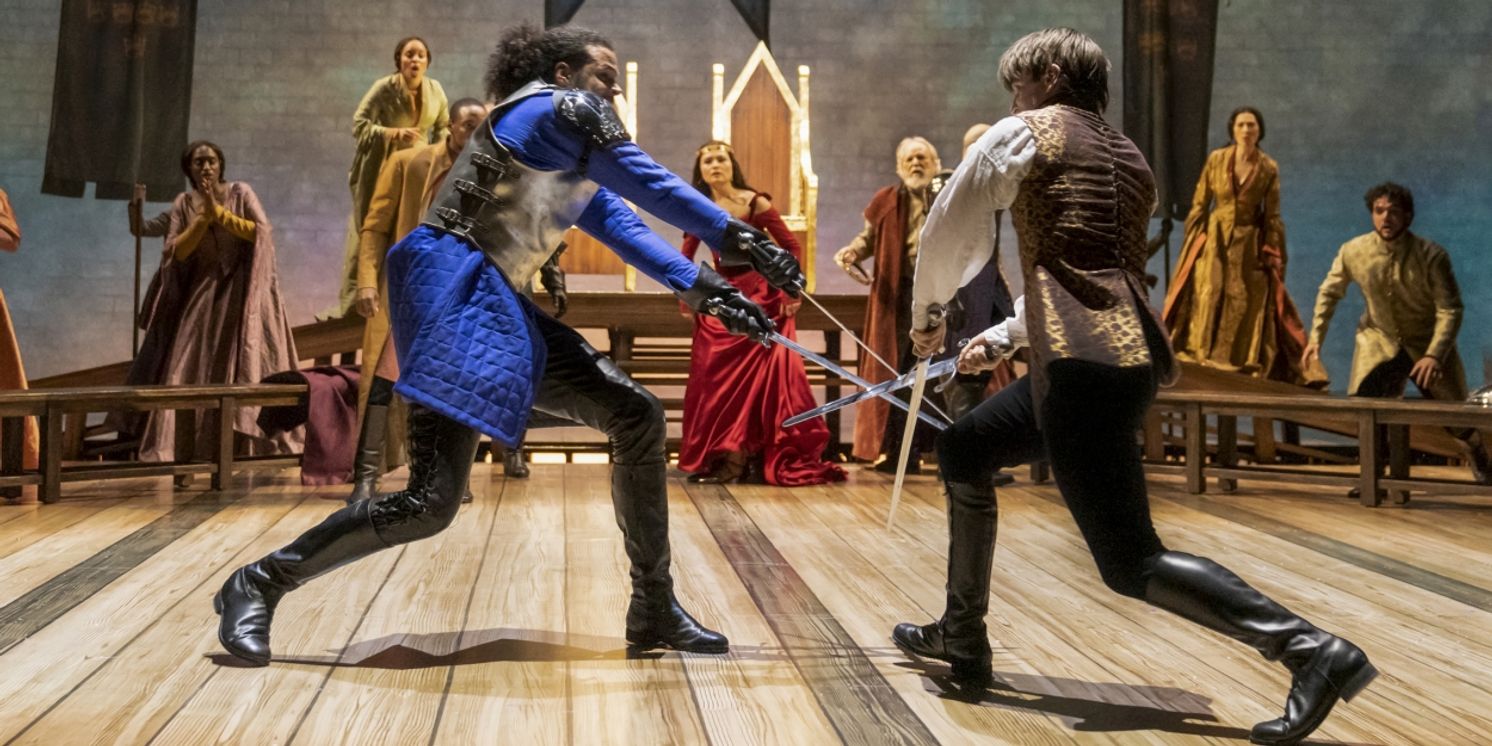Review Roundup: CAMELOT Opens On Broadway Starring Phillipa Soo, Jordan Donica, Andrew Burnap & More
Camelot features a book by acclaimed writer Aaron Sorkin, based on the original book by Alan Jay Lerner, and direction by Tony Award winner Bartlett Sher.

The Lincoln Center Theater production of Lerner and Loewe's Camelot opens tonight at the Vivian Beaumont Theater. Read reviews for the production!
Camelot features a book by acclaimed writer Aaron Sorkin, based on the original book by Alan Jay Lerner, and direction by Tony Award winner Bartlett Sher.
The cast of 27 is headed by Andrew Burnap (as Arthur), Phillipa Soo (as Guenevere), Jordan Donica (as Lancelot Du Lac), Dakin Matthews (as Merlyn/Pellinore), Taylor Trensch (as Mordred), Marilee Talkington (as Morgan Le Fey), Camden McKinnon (as Tom of Warwick) Anthony Michael Lopez (as Sir Dinadan), Fergie Philippe (as Sir Sagramore), and Danny Wolohan (as Sir Lionel). Featured in the ensemble are Delphi Borich, Matías De La Flor, Ṣọla Fadiran, Rachel Fairbanks, Nkrumah Gatling, Christian Mark Gibbs, Holly Gould, Monte Greene, Edwin Joseph, Tesia Kwarteng, James Romney, Ann Sanders, Britney Nicole Simpson, Philip Stoddard, Valerie Torres-Rosario, Frank Viveros, and Paul Whitty.
Jesse Green, The New York Times: Lacking songs to support them, Sorkin’s historical enhancements fall flat. Particularly unconvincing is his sidebar on the evolution of magic into science, with Merlyn (Dakin Matthews, excellent) now a sage, not a wizard, and Morgan (Marilee Talkington) some kind of chemist. (Let’s not even get into Mordred, the mortifying Plot Necessity played by Taylor Trensch.) Forced to maintain the Lerner framework, he can neither justify the romantic story on modern terms nor distract from it in ways that make musical sense.
Jackson McHenry, Vulture: Staging Camelot now means you have to tackle the show as it exists — a somewhat awkward epic with brilliant moments — and address its hazy nostalgic one-brief-shining-moment mythos. Enter Aaron Sorkin. Lincoln Center Theater’s production, directed by Bartlett Sher, is better on the latter front than the former. Its reconstructed book by Sorkin haphazardly drags the musical closer to reality, but it’s in its biggest, grandest gestures where the revival succeeds.
Greg Evans, Deadline: Aaron Sorkin works up an answer to that question in the new Lincoln Center Theater production of the 1960 Lerner & Loewe musical, and the result is an adaptation that seems at every turn to be pleading its case for its own relevance. Where the West Wing creator conjured a real sort of writerly sorcery in 2018 with his transformation of the beloved property To Kill A Mockingbird into a new, relevant and thrilling stage work, his efforts this time around often seem strained in their attempts to drag Camelot into the 21st Century.
Emlyn Travis, Entertainment Weekly: More than 60 years after its original Broadway debut, Camelot's overarching message of trying to make the world a better place — even if one should fail along the way — still feels as fresh and resonant as ever. Reinvigorated by Sorkin — who has long painted a dreamy, egalitarian view of politics within his works — and his new book, the musical succeeds in evoking that dream for one brief, shining moment once again.
Robert Hofler, The Wrap: Once again, Lincoln Center Theater shows that it knows how to amplify a musical. The real singing voices and the real playing of 30 musicians in the pit can be heard. Marc Salzberg and Beth Lake’s sound design merely supports the music; it doesn’t replace the original sound. It’s ironic because when the Vivian Beaumont opened in 1965, the venue was lambasted as the acoustic nightmare of Broadway theaters. Today, it is the last refuge of experiencing Broadway musicals as they were meant to be heard.
Chris Jones, The New York Daily News: This 2023 “Camelot” has more the nihilistic ambiance of “Game of Thrones” than an East Wing filled with art. It’s the chilliest “Camelot” you ever did see and it embodies so many of the current neuroses surrounding the revival of classic American musicals. These include: unease with sex (the barely danced “Lusty Month of May” number is about as sexy as January wind chill); fear of the narrative dominance of a handsome, confident, heterosexual male, which means that Donica gets heavy eyeliner and Burnap, for all his talent, comes off as a less-than-effectual wimp half the time; and, above all, a profound distrust of the ability of people in power, like kings and queens and presidents, to do the right thing. Such a view is perfectly valid, but begs the question: Why are you reviving “Camelot” if not just to cash in on an audience expecting something completely different? Sure, gorgeous songs like “If Ever I Would Leave You” and “I Loved You Once in Silence” are there, and technically well sung with the underpinning of Lincoln Center’s typically fine orchestra, but they are shorn of belief because the production keeps running scared of love.
Adam Feldman, Time Out New York: For all the changes this Camelot attempts, its most traditional aspect comes out on top: Loewe’s music, which is faithfully and beautifully served by a luxurious orchestra of 30 pieces, including six violins. But the production is essentially dispassionate, and there is only so much one can be swept up by the strings. (In the most misguided of his edits, Sorkin sabotages the central love triangle at the finale.) This musical is nearly three hours long, and despite occasional gestures toward liveliness—a maypole dance, an extended sword fight—you can’t help feeling the length. It moves like a funeral procession for itself.
Tim Teeman, The Daily Beast: Then we hear some guards talking to the man she has been talking to. It’s King Arthur. Guenevere visibly wilts under her hooded disguise. She is briefly mortified. The surreally fascinating thing in this Broadway revival of Camelot, directed by Bartlett Sher, is watching this meet-cute curdle into a stultifying, grizzly marriage of two characters with zero chemistry, and then watching that relationship implode entirely—and not really care about its destruction, because this new Camelot doesn’t make us care. Even the swaggering introduction of romantic fly-in-the-ointment Lancelot du Lac (Jordan Donica) doesn’t inject any life.
Steven Suskin
, New York Stage Review: Now comes Lerner and Loewe’s Camelot, which alas cannot hold a candle to My Fair Lady. Director Sher has called in Aaron Sorkin, that man for all seasons, to try to fix the book. Lyricist/librettist Alan Jay Lerner spent a fair amount of time trying to fix it himself; this proved impossible, as the intertwined love stories he concocted are never, either of them, altogether convincing. One doesn’t begrudge the folks at Lincoln Center, nor the authors’ estates, from handing it over to the man from The West Wing. But Sorkin runs into the same problem Lerner did, and without new songs to go with the new characterizations, Camelot remains as disjointed as before.
David Finkle, New York Stage Review: In short, these Camelot revisers do not metaphorically pluck magic sword Excaliber from its stone. They leave it there. There’s simply not a more congenial spot for happily ever-aftering than here in Camelot; it’s just that this particular Camelot spot isn’t that Camelot spot.
Juan A. Ramirez, Theatrely: If this Camelot is a bit confused on whether it wants to be a majestic golden age musical or a gritty take on the shaky foundations of a monarchical ménage à trois, it pulls through on the strength of its cast, which tightly brings the work’s brief shining moment into glorious light.
Frank Rizzo, Variety: But in its place Sorkin and the veteran director Bartlett Sher (“South Pacific,” “The King and I”) jettison much of the fun, too. What remains is a cooler “Camelot,” with its own head-scratching dramaturgy. In making the three central characters — King Arthur (Andrew Burnap), Queen Guenevere (Phillipa Soo) and Sir Lancelot (Jordan Donica) — all tied up in emotional knots yet strangely aloof, the production’s creative team also deprives the show of much of its heart, joy and romance.
Matt Windman, amNY: The idea of Sorkin revising “Camelot” was intriguing and promising. After all, “The West Wing” was marked by a similar kind of political idealism, and Sorkin’s recent stage adaptation of “To Kill a Mockingbird” was well-received. Unfortunately, his new book (which removes all magical elements, turns Morgan Le Fey as a scientist, and questions how Arthur could have pulled the sword from the stone) is too clumsy and self-conscious in its attempt to draw contemporary parallels and critical viewpoints. Sorkin has also seriously disrupted the integration of the songs and dialogue. There is still much to savor in Sher’s lavish production, including a 30-piece orchestra playing the score and Andrew Burnap’s (“The Inheritance”) deeply-felt performance as Arthur. Phillipa Soo (“Hamilton”) struggles with the high soprano songs but makes for a headstrong Guenevere full of personality. Jordan Donica (“My Fair Lady”) can be stiff but is nevertheless an imposing Lancelot with a robust voice. The period visual design is lean and effective, particularly the suits of armor and cathedral-like arches towering above the stage.
Joe Dziemianowicz, New York Theatre Guide: The optimistic notion that greatness is within reach if only for “one brief, shining moment” is indelibly ingrained in Alan Jay Lerner and Frederick Loewe’s 1960 musical Camelot. Director Bartlett Sher’s gray and forbidding revival of the classic show could definitely use a bit more shine. It’s dark a lot in this Camelot. Running 3 hours at Lincoln Center's Vivian Beaumont Theater, the production is stately and beautifully sung, yet it’s seldom exciting or joyful. That's a long sit for, essentially, a relatively straightforward story.
Howard Miller, Talkin' Broadway: Director Bartlett Sher's usually strong hand seems to have focused largely on the staging, which is often quite effective. There is an especially nerve-wracking scene of close swordplay that is a visual highlight of the action. Ultimately, though, this Camelot revival falls on its own sword with its reworked book.
Brittani Samuel, Broadway News: Filling up all that empty space, however, are some of the American theater’s finest talents. Burnap and Soo are crisp conductors of Lerner and Loewe’s vocal score. Donica as Sir Lancelot is a revelation; Sher architects for him one of the sexiest Broadway entrances I’ve seen all year. Lancelot’s devout zeal for serving the king is complicated by his attraction to Guenevere, sparking a love triangle that earths the fantastical tale in the most human of impulses: desire, jealousy, lust. Lancelot, restrained by his allegiance to the throne, sings “If Ever I Would Leave You” — an aching aria of yearning — to Guenevere, conjuring a level of heat matched only by the balmy, 75-degree weather outside Lincoln Center’s doors. It helps that this song, and the remainder of them, is in the prodigious hands of music director/conductor Kimberly Grigsby and her 30-piece pit orchestra. Grigsby keeps firm control over the spritely percussive swells and thunderous drum rumbles driving the action of “Camelot” forward.
David Cote , The Observer: Amid the bland casting and cold, murky design, there is a warm, beating center: Soo. Her Guenevere is regal, sexy, smart yet fallible. In the first act’s frisky ode to pastoral hedonism, “The Lusty Month of May,” Soo hitches up her peasant-style skirt and jigs with abandon, pumping desperately needed excitement and humanity into the room. You believe two powerful men could fall for Guenevere, to the ruination of the Round Table, chivalry, and perhaps England itself. But it would take a magic potion for her to look twice at either of them.
Average Rating: 54.7%
- To read more reviews, click here!
- Discuss the show on the BroadwayWorld Forum
Reader Reviews
Powered by
|
Videos



